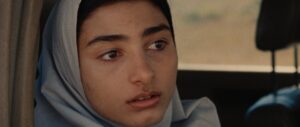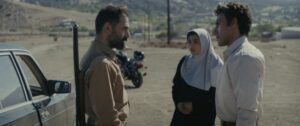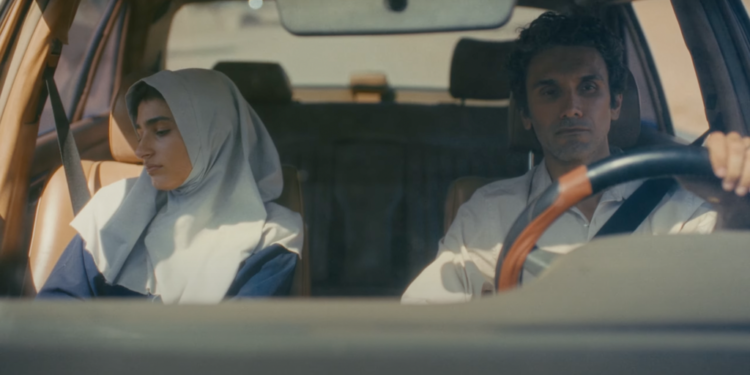Julia Elihu’s In the Garden of Tulips is a journey towards a reluctant but necessary goodbye. A young woman must somehow inform her father that this last car ride together will ensure her bountiful future, and he, in turn, must learn to let go in order for her to feel his admiration and love. Julia Elihu’s film, based on screenwriter Ava Lalezarzadeh’s mother’s story, allows the Iran-Iraq conflict to live on the periphery as it enhances the emotional reverberations of war.
**We have linked In the Garden of Tulips below. Please take the time to watch Elihu’s film and then scroll up to read the conversation with the creative team.**
In the Garden of Tulips is spare in its setup but substantial in its textures and context. Lalezarzadeh plays Caroline, a young woman being taken through the Iranian countryside with her father, Sharif. His goal is to get her to safety, but not knowing when they will see each other again looms over them.
We have seen so many shorts that revisit combat or literal fighting, but it feels like the noise of battle is somehow far in the distance. We feel the physical and emotional toll, but we never see it. There is an evolution of tension throughout Elihu’s film, but we feel like we are escaping that violence as Sharif and Caroline barrel down the road.
“Ava and I come from the same background–we’re both Iranian Jews–and our families have these similar stories,” Elihu explains. “When I read her script, that was the obvious connection, but telling a story that is more stripped down and held back, that’s what attracted me to the script. When I was reading it, that’s what I wanted to tap into. A story that is simple story centered on our protagonist, Caroline, and how she is scared and isn’t sure what’s going to happen. That push into adulthood and seeing that beautiful strength and resilience that’s almost pushed upon her really motivated me to make it more stripped back. I wanted to keep the sound design and the score diegetic and keep the framing quite simple and try to keep it as tight a I could on Caroline with the exception of showing the environment from her perspective.”
“This story is about my mother leaving Iran during the Iran-Iraq war, and often, when telling me this story growing up, one of the most impactful moments for her was her saying goodbye to her homeland and her father,” Lalezarzadeh says. “He would pass her off to a smuggler. When I was writing it, it was important to me to not show the war, the reverberations, like you say, of it. What do you do in those final moments? How do you possibly say goodbye? A consequence of war is children having to grow up faster than they have to and being forced to become an adult in a day. It’s agonizing.”
 I admitted that I wouldn’t know what I would do if I was in either of these character’s shoes. I would try to fill the space with as much conversation as possible as I struggled to find the right words–are there right words?
I admitted that I wouldn’t know what I would do if I was in either of these character’s shoes. I would try to fill the space with as much conversation as possible as I struggled to find the right words–are there right words?
“I think you are in the same place as the father, Sharif,” Elihu ponders. “He’s trying to break the silence by cheering her up and singing this song. That’s the natural, human instinct–to break that silence. We are showing that in this real-life story, so keeping that tangible was important to us.”
A majority of the runtime is spent in the confines of Sharif’s car, but a theme throughout Elihu’s film relates to withheld and expelled emotions. They sing and chat in the car, the sounds bouncing off the close car doors and windows. There are difficulties to filming such an emotional film in such a small space.
“Julia was concerned, because it increased the scope of the film initially, and I was excited because I thought it decreased the scope of the film,” Aaron Lemle, the producer of the film, says. “I thought this was actually a smart way to shoot a period piece that takes place in a foreign country because it would just limit the scope that the world that we would have to see and limit our production design and extras and that kind of thing. It then became clear during pre-production that we weren’t going to limit that stuff, and we were going to be outside the care a lot. As far as some of the challenges of shooting in cars, we knew that these were the most important scenes in the film. It’s where the emotional legwork is really happening.”
“It was difficult to keep it nuanced in such a contained environment,” Elihu admits. “But I think that’s what’s so beautiful about this scenario. These two characters in the car are in this private space, tucked away from the rest of the world which is kind of one of the main themes of the film. They almost have to live in hiding within the Iranian regime, and they really can’t share certain parts of their identity. That added a super beautiful element of intimacy to the film. One of the Sharif is whispering the Hebrew prayer, the Shema, to Caroline. That’s the perfect exemplification of that intimacy in the car before seeing them in the chaos of this loud bazaar.”
Lalezarzadeh notes how the outside world can sometimes feel like an invasion.
“Once they’re singing, they’re in the privacy of their own space, and just when they’ve forgotten the outside world, boom,” she says. “The public comes banging through the window and they police officer confronts them just as there’s a moment of levity, public space interferes again in their lives. I think so many Iranians living in Iran experience this double shadowed identity of their lives indoors versus their identity outdoors in public under the rules of the regime. The car is a good embodiment of that.”
 When an officer stops their drive, we feel their tension. It scratches at our skin before Caroline wordlessly reveals something to the audience. For the entirely of the film, Caroline and Sharif occupy and share the same space. They are close to one another, but the officer speaking to Sharif separately almost hints at the inevitable separation that they are driving towards. It’s a test that comes at the very last minute, and the filmmakers knew how to ratchet up that momentum.
When an officer stops their drive, we feel their tension. It scratches at our skin before Caroline wordlessly reveals something to the audience. For the entirely of the film, Caroline and Sharif occupy and share the same space. They are close to one another, but the officer speaking to Sharif separately almost hints at the inevitable separation that they are driving towards. It’s a test that comes at the very last minute, and the filmmakers knew how to ratchet up that momentum.
“I had deliberately written it in such a way where like each beat grew with tension, and Julia lifted it from the page so beautifully,” Lalezarzadeh says. “That is the moment where we reveal that she’s Jewish and I think the audience doesn’t quite understand what’s happening at first. Then it comes into focus and the tension goes up and the stakes go up. It’s this scene where the transfer of power happens between Caroline and Sharif. Up until this moment, Sharif has been extending kindness, and he’s keeping it together–he’s trying to protect his daughter. In this moment, though, they are separated, and she doesn’t hear what he’s saying to the officer. When they step out of the car, it’s this intuitive moment where she guesses what he said, and it works. The baton gets passed that she is capable of protecting and preserving herself. From that moment on, we begin to see him crack, and she starts giving him kindness and holding him in comfort.”
“This scene is so great, because there’s no real violence, but it’s still very present,” Lemle adds. “The cop has his gun and Caroline has this necklace, and you understand what could potentially happen.”
“That is really one of the first beats of tension that really showcases what the conflict is in this story,” Elihu says. “When we were thinking about how are we going to shoot this scene and tie it together, our DP, Freddie Whitman, and I were chatting about making this moment kind of handheld and shaky. The camera was just whipping around from person to person to increase that feeling all around. It wasn’t a planned out shot list where we needed to get this or that, but I wanted you to feel those beats. I think he did a really beautiful job of capturing that tension and that fear. I have seen the film hundreds of times, and my heart still races too.”









